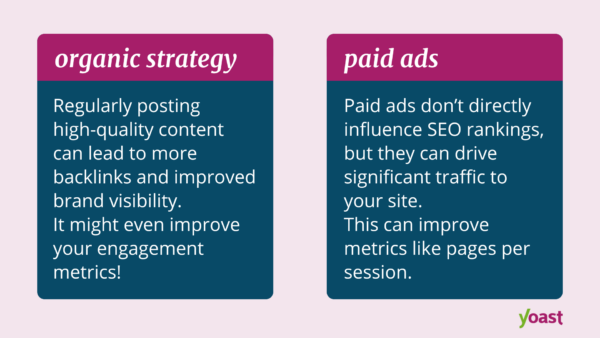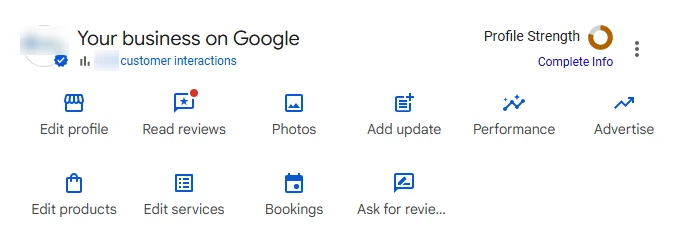Even if you’re a new or experienced business owner, you can’t ignore the impact of social media on your business. It’s great for marketing, brand awareness, and SEO. But it’s quite a hassle to keep track of your social media accounts, website, blog, and your product(s). To save you time and money, we’ll be looking at what benefits your SEO the most: an organic social media strategy or using social media ads?
What is an organic social media strategy?
First, what is an organic social media strategy? Well, it’s the opposite of using social media ads—something you have to pay for. An organic strategy means you use free/unpaid methods of creating and sharing content on social media platforms to build an engaged audience.
In other words, you regularly post high-quality content on your social media accounts. Plus, another important part of an organic strategy is engaging with your audience through, for example, comments.
The SEO advantages of organic social media
Long-term benefits
There are a lot of long-term benefits from having an organic strategy. If you post consistently for a long time, you’ll usually get sustained engagement and traffic from your posts. Which, in turn, can lead to higher search engine rankings.
Authenticity and engagement
Another benefit is the authenticity of your content—which is becoming increasingly more important nowadays. People want to know if they can trust your brand. By regularly posting authentic content and engaging with your audience, you’ll be able to boost your brand reputation and indirectly boost your SEO.
So how does engagement boost your SEO? Well, likes, shares, and comments can influence your SEO by signaling that your content is relevant and popular. Plus, now that Google shows social media content in their search results more often, it can only be a good thing to have great engagement metrics.
The disadvantages of organic social media
It takes some time
To see the benefits of an organic social media strategy, you have to post consistently over a long period of time. This can also be a disadvantage, however. Sometimes you want to launch a new brand or product, and you don’t want to post about it for months before you catch people’s attention.
Even though you do get results with an organic strategy, it can take months to see significant results. So you need to have patience!
Consistency is important
It’s a key component, in fact. For an effective organic strategy, you need to continuously and consistently put in the effort to maintain your brand’s visibility and engagement. This means you need to stay on top of your feed and regularly brainstorm what might be interesting content for your audience. Which does take time and effort.
What are social media ads?
Social media ads are pretty straightforward. They’re paid advertisements that you can run on social media platforms like Meta (which includes Facebook and Instagram), X and YouTube. It’s also good to know that there are various advertisement types, such as display ads, video ads, sponsored posts, etc. Depending on your goal and audience, you choose one of these.

As we just mentioned, social media ads are paid advertisements. The costs, however, can vary, depending on your audience, the type of ad, and the duration of your campaign. That’s why some campaigns might be more expensive than others!

The SEO advantages of paid social media
Quick results
As opposed to an organic strategy, ads can generate immediate traffic and engagement to your site. This could indirectly improve your SEO because your engagement metrics will increase.
Plus, if you’re promoting high-quality content, then people are more likely to share it, like it, and link to it. Which is all very valuable for your SEO.
Reach your target audience
Ads also make it relatively easy to reach your target audience. When you set up an ad, you can fill in precise information that will allow you to reach people from a certain demographic, with certain interests and behaviors.
If those people like the content you’ve boosted, they might even follow your account. That would be the ideal situation, since they will now also see your organic posts.
The disadvantages of paid social media
Costs
This is a no-brainer since it’s in the name, but it’s still worth mentioning. Paying for ads can get quite expensive. Especially if this is your social media strategy, and you don’t have an organic strategy.
If that’s the case, you’ll have to continuously invest in social media ads to maintain your brand’s visibility.
Short-term impact
Ads only run for a limited time. If your campaign is over and your ad isn’t promoted anymore, then your traffic and engagement from that ad will drop. In other words, there are no lasting SEO benefits from paid ads.
Ad fatigue
Yep, it’s a thing! Seeing an ad too often can desensitize people. In other words: people get bored from seeing the same ad and they stop paying attention. Which means your ad will become less effective. Have you ever seen a TV ad so many times that you get tired of it? It’s the same thing. Ad fatigue.
Overall impact on SEO: organic versus paid
We’ve talked about the SEO advantages to both strategies, but let’s briefly summarize.
- Having an organic social media strategy means you regularly post high-quality content, which can lead to more backlinks and improved brand visibility. It might even improve your engagement metrics!
- Using paid ads will not directly influence your SEO ranking. However, ads can drive significant traffic to your site, which in turn can improve metrics like pages per session.

Which strategy is better?
As always, the answer fully depends on your goals and how much you’re willing to invest into your social media strategy, be it time or money or both. To maximize the impact of your social media on your SEO however, we would recommend using both strategies.
Why? Because you can use ads to boost new or high-value content to reach your target audience. Once the initial buzz of an ad has died down, you can keep people interested with your organic posts.
Tip: utilize analytics
Most social media platforms offer you insight into the performance of your organic and paid posts. Use this to check which posts are resonating with your audience and which aren’t. If you combine this data with your website’s analytics, you’ll be able to easily adjust your strategy, so you can focus on what works best.
Conclusion
Both organic and paid strategies have their advantages. An organic social media strategy will result in slow and steady growth with lasting benefits for your business. However, this will take a lot of time before you see any results. On the other hand, using paid ads will give you quick results and allows you to target the exact audience that you want to reach. But paid ads can get expensive, so they might be more useful for immediate traffic boosts or announcing a new product or service to your audience.
That’s why it might be in your best interest to combine both, so you’ll have the benefits of building a connection with your audience while also boosting your growth with paid ads.
Read more: Are social media platforms becoming the new search engines? »
The post Social media ads vs. organic strategy: which is better for SEO? appeared first on Yoast.



It’s interesting to see the emphasis on organic social media strategies, especially considering how they can enhance SEO without the financial commitment of ads. From my experience, one key benefit of organic strategies is the authentic engagement they foster. When businesses interact genuinely with their audience, it not only strengthens relationships but also builds trust—an essential currency in today’s digital marketing landscape.
I really appreciate your perspective on the value of organic social media strategies. It’s true that when brands focus on genuine interaction rather than just pushing sales, it creates a whole different dynamic. Trust is so crucial in today’s digital landscape, especially with consumers becoming increasingly savvy and skeptical of traditional advertising.
You’ve hit on something really important with the emphasis on genuine interaction. It’s easy to get caught up in chasing numbers—likes, follows, sales—but at the end of the day, it’s those authentic connections that often lead to more meaningful relationships with consumers.
You’ve hit on something really important with the emphasis on genuine interaction. It’s true that in a world so focused on metrics, it can be easy to lose sight of what really matters. I’ve found that the brands and creators I connect with the most are the ones who prioritize building community over just accumulating numbers.
I completely relate to your point about authentic connections—this article offers some practical tips on crafting a social media report that prioritizes genuine interaction over just numbers.
‘How to create a social media report [free template included]’
https://localseoresources.com/how-to-create-a-social-media-report-free-template-included/.
You raise some great points about the importance of genuine interaction in today’s digital landscape. It’s easy to get lost in an ocean of likes and shares while forgetting that social media is, at its core, about relationships. The reliance on hard metrics can often overshadow the human element.
I’m glad to hear you resonate with the importance of genuine interaction! For those looking to deepen their community engagement, I’ve created a resource that might be helpful. Check out my article on crafting a social media report that truly reflects authentic connections, complete with a free template to guide you!
https://localseoresources.com/ninja
Ah, the perennial debate of organic strategies versus social media ads—like the dramatic “Will they, won’t they?” saga of a rom-com! I can totally relate to the frustration of juggling all those social media accounts; it feels a bit like trying to maintain a stable relationship with multiple partners while convincing your mom you can handle your life just fine—multitasking level: expert.
You nailed it with the rom-com analogy—it’s such an interesting dynamic. The organic strategies feel like those slow-burn relationships you root for, while social media ads can sometimes come off as that impulsive fling that seems fun but doesn’t always have the depth. Balancing multiple social media accounts really does reflect that juggling act of life, doesn’t it?
I love how you described that dynamic—it’s such a relatable analogy. The slow-burn relationships in organic strategies really do create a sense of connection that feels more meaningful in the long run. There’s just something about nurturing that growth and seeing how it evolves over time, kind of like investing in a friendship that blossoms into something deeper.
It’s so refreshing to see someone recognize the depth in those slow-burn relationships, whether we’re talking about connections in our personal lives or in broader organic strategies. The way you framed it—like investing in a friendship—really resonates. There’s a certain patience and authenticity in nurturing that growth, don’t you think?
You’ve made some compelling points regarding the tension between organic social media strategies and paid social media ads. While I appreciate the focus on organic methods for their cost-effectiveness and ability to foster genuine connections, I can’t help but think that there’s often a misconception about the practicality and impact of organic strategies, especially for businesses looking to make a significant mark in competitive markets.